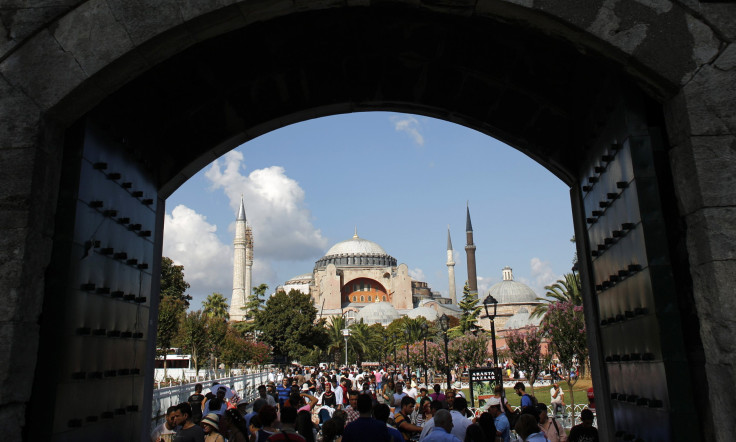Hagia Sophia Mosque Conversion? Turkey Pope Backlash Could Open Historic Church To Muslim Worship

The Turkish backlash to Pope Francis’ recent acknowledgement of the Armenian genocide took on a new dimension Thursday as a leading Islamic figure in Turkey’s capital suggested that the Catholic leader’s comments would only hasten the process of reopening Istanbul’s Hagia Sophia to Muslim worship. The Mufti of Ankara’s comments have raised the question of whether Turkey’s Islamist-led government plans to convert the former Byzantine cathedral to a mosque, Turkish media reported on Thursday.
“The statement that the Catholic world’s spiritual leader delivered three days ago, saying Armenians had been subjected to a genocide, is extremely spectacular,” Mufti Mefail Hızlı said in a written statement reported by the Turkish news site Hurriyet. “Frankly, I believe that the pope’s remarks will only accelerate the process for Hagia Sophia to be re-opened for [Muslim] worship.”
The status of the historic building, considered to be among the world’s great monuments as well as one of the most important structures in Byzantine architecture, is a sensitive subject both within Turkey and across the region. Until 1453, the Hagia Sophia served as a Greek Orthodox cathedral after which it was repurposed as a mosque by Ottoman invaders. The secular founders of the modern Turkish republic later closed the mosque and reopened the building as a museum open to the public in 1935.
In recent years a number of campaigns have been launched to reopen the building to Muslim prayer, an effort that has met with resistance from Turkish secularists and outrage from neighboring Greece. Turkish Deputy Prime Minister Bülent Arınç, a member of the ruling Islamist AKP party, became the most notable political figure to give voice to the growing campaign in November 2013 when he expressed his hope that the “Hagia Sophia Mosque” could soon be used as an actual mosque. Greece, which sees the structure as part of its own historical heritage, reacted furiously, with its foreign ministry releasing a statement calling the idea “an insult to the religious sensibilities of millions of Christians.”
The drive to allow Muslim worship in the building will only intensify in response to the pope’s remarks about the Armenian genocide which, according to Hızlı reflect “a modern color of the crusader wars launched in these lands for centuries.” The Mufti is not alone in condemning the Catholic leader in the aftermath of his decision to characterize the mass slaughter as the “first genocide of the 20th century” during a sermon on Sunday. Top Turkish officials, including President Recep Tayyip Erdoğan and Prime Minister Ahmet Davutoglu, have also made their displeasure with the pontiff resoundingly clear, with the latter suggesting that Francis had joined in an “evil front” plotting against Turkey.
Historians estimate that nearly 1.5 million Armenians were killed by Ottoman Turks during the World War I era, in what is widely considered a genocide. Turkey, however, steadfastly denies the charge, arguing that the death toll has been exaggerated and the product of civil unrest and disease rather than a systematic campaign of slaughter.
Pope Francis had previously attempted to build bridges between Christianity, including the Orthodox Church, and Islam during a visit to Turkey late last year. The Catholic leader, who received a rock star’s welcome upon his arrival to an Istanbul church, used the trip to call for the protection of religious minorities in the Middle East and his belief that Christians and Muslims must work together to ensure that Christianity was not driven from its birthplace in the region.
© Copyright IBTimes 2024. All rights reserved.






















